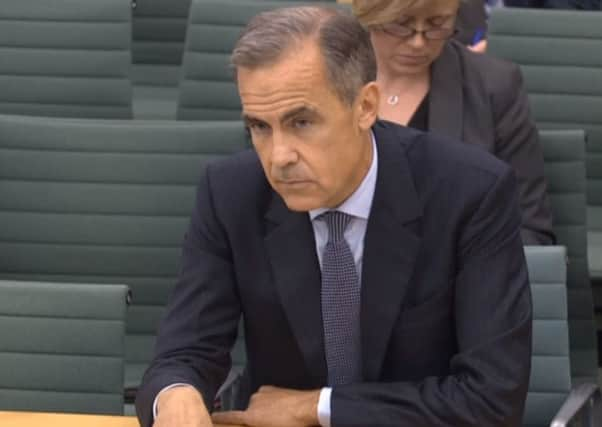Carney: Blaming central banks for economic woes is '˜deflecting'


Mr Carney told MPs that central banks were not to blame for low interest rates and global inequality.
It comes after President-elect Donald Trump took aim at the US Federal Reserve, and follows criticism by Prime Minister Theresa May who has claimed the Bank’s easing efforts were disproportionately hurting savers while benefiting the asset-rich.
Advertisement
Hide AdAdvertisement
Hide AdLow rates and inequality, “are caused by much more fundamental factors and an excessive focus on monetary policy in many respects is a massive deflection exercise,” he told the Treasury Select Committee.
Mr Carney went on to defend the use of “exceptional” monetary policy tools like quantitative easing, which he said were “a symptom of the situation”.
“The causes are much more fundamental, the solutions are much more fundamental. Curing the patient requires the operation and monetary policy is keeping the patient alive,” he said.
Mr Carney confirmed to MPs that he would be stepping down as governor in June 2019, regardless of when Article 50 was triggered.
It followed questions from Treasury Committee chairman Andrew Tyrie, who asked Mr Carney whether he might extend his term if the timeline of Brexit negotiations were to change.
The governor originally committed to a five year term with the option of another three years, but decided to extend it by one year to cover the expected period of EU negotiations.
Mr Carney went on to reply to MPs’ concerns that the Bank’s Monetary Policy Committee (MPC) might be out of touch with regional businesses, particularly in the wake of Brexit.
Advertisement
Hide AdAdvertisement
Hide AdHe said that MPC members and regional agents were in close contact with leaders of small, medium and large businesses, adding that he personally toured the country once a year.
He pointed to a recent Bank survey which found that about 45% of businesses had shelved or delayed investments following the referendum.
However, a little more than half of the UK businesses polled said Brexit was a “non-issue”.
“So they’re not adjusting based on the twists and turns of the Brexit process, either they’re entirely domestically focused or they’re focused on third country export markets.
“And in fact if they’re the latter type of business, the adjustment in the exchange rate is obviously a positive development and they’re moving forward,” he said, referring to the near 20% drop in sterling against the US dollar since the referendum.
But changing investment patterns could have an impact on long-term growth.
The Bank recently revised up its Gross Domestic Product (GDP) growth forecasts to 2.2% for 2016 and 1.4% in 2017, but slashed its projections for 2018 to 1.5% from 1.8%, giving a gloomy outlook for households, with higher unemployment and soaring inflation set to knock their spending power.
It would mark a departure from current consumer spending rates, which have held up in the wake of Brexit.